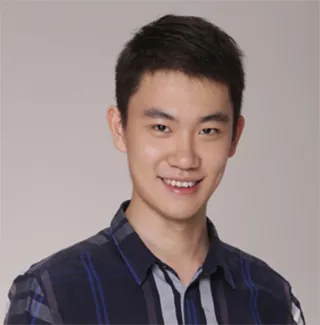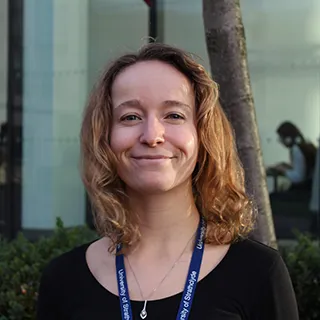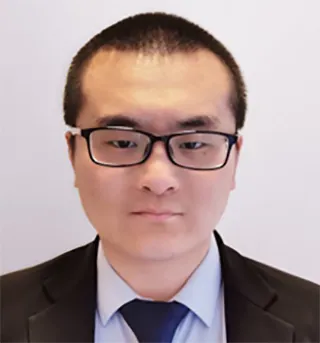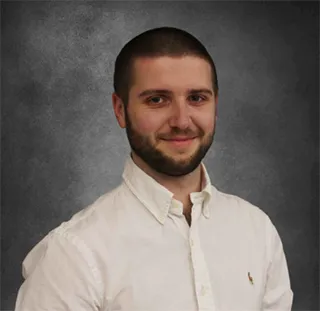IET Postgraduate Scholarship for an outstanding researcher

Daniel Hoare
Daniel Hoare is a PhD student designing and fabricating nanosensors for integration into implantable vascular devices. By implanting sensors into a patient’s body, he hopes that this will enable doctors to be able to remotely monitor conditions without the need for them to go into hospital. Most importantly this will enable early detection of diseases and as such early treatment which will hopefully lead to better patient outcomes.
At school Daniel was fortunate to have dedicated electronics lessons that encouraged hardware and software development which ignited his interest. However, after his father suffered a heart attack during the later part of his schooling, he became wrapped up learning about the heart and how to treat it. Daniel’s undergraduate and master’s degrees focused on clinical cardiology and cardiovascular research, but something was missing. On finishing his masters, Daniel wanted to find a way to make an impact on patients through novel technologies, which led him to the University of Glasgow. At Glasgow, Daniel was able to reignite the passion in electronics that he had from a young age.
This award from the IET is an honour for Daniel and the research project he is part of. It will enable him to further his research by visiting collaborators around the world to gain first-hand skills and knowledge that he can bring back to his colleagues at the University of Glasgow.
Hudswell International Research Scholarship

Bochen Shi
Bochen Shi is a PhD candidate under the supervision of Professor Zhengming Zhao at the Department of Electrical Engineering, Tsinghua University, China.
During his PhD program, Bochen works on the discrete state event-driven modeling and simulation of power electronics systems and the development of DSIM software. His research is fuelled by the demand for fast and accurate design simulations of complex power converters. Lack of such tools has become a bottleneck with the increasing focus on electrification for a cleaner environment.
Bochen’s PhD research speeds-up the simulation of large-scale power converters by hundreds/thousands of times with complete accuracy and eliminates the convergence problems when modeling the nanosecond-level switching transients. It advances the design and prototyping of power electronics systems among a wide range of applications including power system, motor drive, renewable energy, electric aircraft/train/vehicle. His PhD research has been published in multiple articles in high-impact journals and marks a breakthrough in large-scale power electronics simulation.
The IET Hudswell International Research Scholarship will help him disseminate his work among the world-wide community of power and energy, continuously improve the DSIM software according to people’s feedback, and support his further research in real-time simulation of power electronics.
Leslie H Paddle Scholarship

Jennifer Morris
Jennifer Morris is a PhD student in Electronic and Electrical Engineering at the University of Strathclyde.
Her research focuses on the control of power electronic converters for connecting offshore wind farms to weak AC networks via HVDC. The ongoing shift from synchronous generation (oil, coal and gas) to renewable energy is causing power systems worldwide to become ‘weaker’. This raises significant stability issues for the power electronic converters which interface renewable generation and HVDC transmission links to the grid.
Using a variety of stability analysis, simulation, and hardware methods, Jennifer’s research aims to better understand and quantify the mechanisms causing instability for power converters in weak grids. She hopes to develop new, improved control strategies and investigate the impact of multi-infeed HVDC on system stability.
The Leslie H Paddle Scholarship will help Jennifer to engage in industry and academic collaborations within her research, publish findings, and reach out to younger generations through STEM ambassador events.
IET Postgraduate Prize

Chao Gong
Chao Gong is a PhD student at the Department of Electronic Engineering, University of York. His research interest is safety of high-voltage powertrain based electric vehicles.
The charm of electric vehicles has been inspiring him to learn more about them. As a high-tech product, the engineering technologies involved in electric vehicles are undoubtedly complicated and only by pursuing a higher-level study in electric vehicle engineering can he get closer to them. He believes pursuing an engineering-related PhD could enrich his knowledge and technical skills to engineer a better world with sustainable transportation.
During his doctoral research, Chao developed reliable winding-based DC-bus capacitor-discharge techniques to prevent occupants in electric vehicles from electric shock in post-crash conditions. The proposed technologies also have the advantages of fast discharge and low cost. In this research, he is positive to share the findings in the form of publications and conference posters, which are highly recognised by peer scholars.
The IET Postgraduate Prize will motivate Chao to build on his confidence to go further in his research. With the support of the prize, he plans to attend more conferences and summits to seek domestic and international collaborations.
IET Postgraduate Prize

Kyle Walker
Kyle Walker is currently a PhD student in Marine Robotics at the University of Edinburgh, where he is the recipient of an EPSRC Doctoral Training Partnership Studentship.
When deciding to go to university, Kyle was caught between Mechanical and Electrical engineering, eventually opting to meet in the middle and study Electrical and Mechanical Engineering as an integrated masters at the University of Strathclyde. During this time, he became interested in robotics and how creative and innovative the field is, as well as being highly interdisciplinary. Kyle decided to undertake a PhD as he wanted to research topics and develop systems that he sees as being beneficial for future generations. He hopes his PhD will lead to a career where he will have the opportunity to do that.
His current research focuses on developing predictive control methods for subsea vehicles, with the aim of improving their ability to operate in adverse conditions around marine renewable devices. In doing this, the overall operation and maintenance costs of these devices will be reduced thus improving cost efficiency, helping contribute to the shift towards renewable energy generation.
The recognition gained from the IET Postgraduate prize will help support Kyle in promoting his work, enabling him to establish global academic and industrial collaborations. He aims to pursue a post-doctoral research role whilst reaching out to potential partners within the renewable energy sector and test his method in the field.
IET Postgraduate Prize

Eva Bestelink
Eva Bestelink is a PhD student at the Advanced Technology Institute, University of Surrey, where she is supervised by Dr Radu Sporea.
Prior to her BEng degree, Eva was a mature student undergoing a career change. During her MSc in Neuroscience, she discovered mind-controlled prosthetics and decided to pursue a career in robotics. However, without the required STEM degree or relevant A-Levels, particularly mathematics, Eva had to make the decision between a PhD in an unrelated field or start over. Fortunately, universities offer engineering foundation years and Eva completed hers at Kingston University, which paved the way for her acceptance at University of Surrey for her BEng in Electronic Engineering. Soon after joining, Eva quickly realised that semiconductor devices were her true calling and could see parallels between neural behaviour and unconventional ways of operating transistors. This was the inspiration behind the invention of the multimodal transistor.
During her BEng in Electronic Engineering with Nanotechnology, she co-invented with Dr Sporea a new type of thin-film transistor (TFT), the multimodal transistor (MMT), which is now the main focus of her doctoral research. The MMT’s operation differs from conventional TFTs, contributing to advanced functionality with robust performance in a compact footprint. As such, it is highly suited to low-cost, high-throughput manufacturing methods, for example roll-to-roll or inkjet printing.
Eva aims to continue her work on the MMT, developing circuits and applications in high-throughput processes, towards developing energy-efficient and eco-disposable sensors for the Internet of Things.
Supported by the IET Postgraduate Award, Eva plans to reach out to young innovators and women in engineering, as well as develop scientific learning materials aimed at young children.
IET Postgraduate Prize

Stephanie Adeyemo
Stephanie Adeyemo is a PhD student in Electrical Engineering at the University of Cambridge. She is an alumna of Swansea University where she completed her Bachelor’s degree in Electronic and Electrical Engineering.
Her PhD research work focuses on utilising terahertz spectroscopy, a contact-free and non-destructive optical characterisation technique, to study the optoelectronic properties of nanomaterials particularly of tin-based metal halide perovskites and nanowires. By studying the optoelectronic properties of these materials, she gains insight into the fundamental photophysical mechanisms important to guide the development of high performing devices for applications such as photovoltaics.
The IET Postgraduate Research Prize will enable Stephanie to explore new research ideas which will form the basis of her postdoctoral research and give her the opportunity to present at international conferences.
Interested in applying?
Find out more about applying for one of our Postgrad Research Awards.
